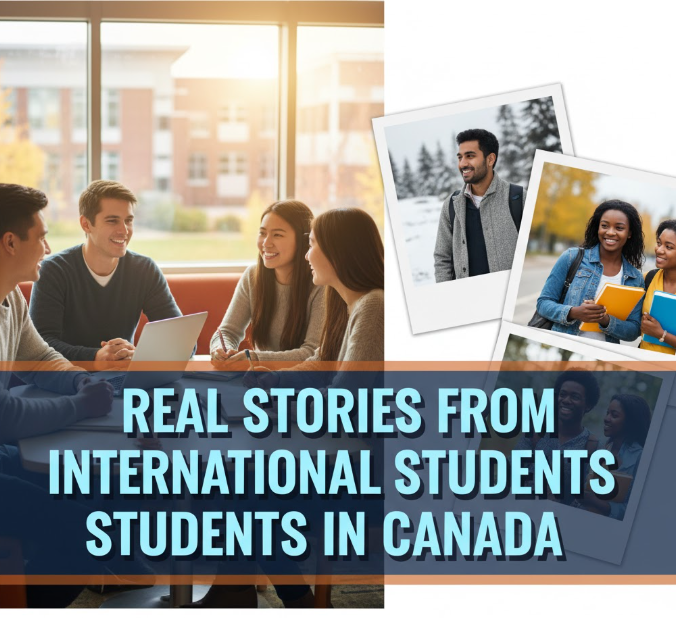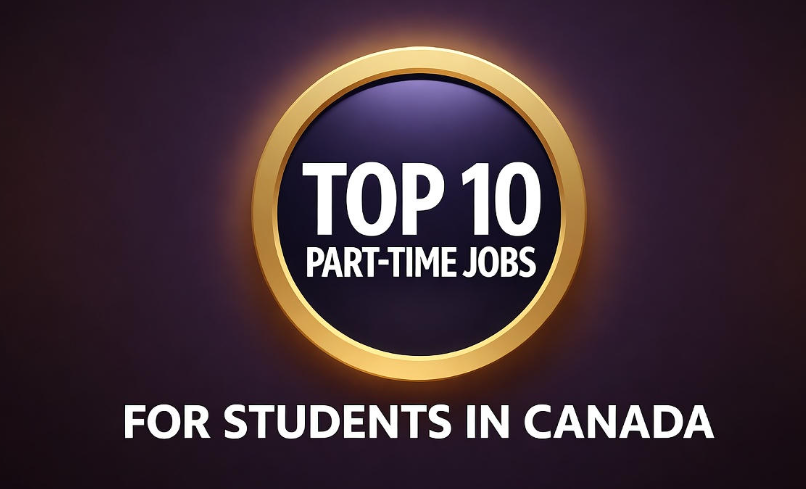Deciding to study overseas is a major decision. For thousands of young people each year, Canada becomes that home away from home. But what is it like to be an international student in Canada really? Beyond the glossy brochures, and website promises, what do students struggle to handle? What amazing experiences await them?
In this piece, we will let the students who’ve lived it tell you about it. These are true stories of real people who packed everything they owned into a single suitcase and travelled halfway around the world in search of Canadian freedom. Their reflections also will provide a candid peak behind the curtain of student life — from those heady first days out on their own, to spending late nights at the library eager to be home and struggling with homesickness.
Maria’s Journey From Mexico City to Montreal
A Love for Winter
Maria Rodriguez never thought she would fall in love with winter. She had never seen snow growing up in the balmy Mexico City, not until she came to Montreal for her computer science degree at McGill University.
“I got off the plane in January wearing 3 jackets and I was still cold,” Maria jokes. “I thought I was nuts, but my roommate from Vancouver said she’d never felt minus-20-degrees before.”
The First Month Was Tough
Maria’s first few weeks were much more challenging than she had anticipated. The language challenge was tough — though she had studied English for years.
“The professors were speaking so fast in class. Everyone spoke slang that I didn’t know. I would study for hours to get through readings that Canadians got done in 30 minutes,” she explains.
Money was another stress. While Maria had scrimped and saved, she hadn’t realized how pricey everything was going to be.
“Back home, I could eat out for $3. In Montreal a modest meal cost $15. My student budget ran out more quickly than I imagined it would. I had to learn how to make food, which I’d never done before,” she says.
Finding Her People Changed Everything
It was with the Latin American Student Association that things began to look up. There she found people who knew exactly what she was experiencing.
“We would have potlucks where everyone brought the food of their home. For a few hours, I didn’t feel as far away from my family. These friends were my Canadian family!” Maria adds.
She also found there were a lot of Canadian students out to make friends around the world. Her study group “took her in” and explained confusing lectures and invited her to their weekend activities.
“Canadians are genuinely friendly. The second I started speaking, and not being so afraid to mess up with my English, people were so supportive,” she says.
Three Years Later
Since today Maria is a senior. She has a summer internship at a tech company in Toronto and is fluent in English. She even gave her Canadian friends a lesson in how to make real tacos.
“Would I do it again? Absolutely. The first year was rough, really rough. But working my way through that just made me stronger. I’m not the same shy girl that came three years ago,” Maria writes.
Reality Check Toronto: Raj Realizes His Dreams Vs the Reality in Toronto
Raj Patel came to Toronto with hopes as high as an elephant’s eye. The 19-year-old, from Mumbai, had selected the University of Toronto for its business program and Canada’s record as a welcoming destination for immigrants.
“I thought it would be how things are in movies and that I’d make friends straight away, get a part time job with no issues, the perfect student life,” Raj admits. “Reality hit me pretty fast.”
The Job Hunt Struggle
It was far more challenging than Raj had expected to find part-time work. It had been extremely frustrating, despite his work permit permitting 20 hours per week when school was in session, to get that first job.
“In the first two months, I applied to over 40 positions. Coffee shops, restaurants, retail: I did it all. Most places asked for Canadian experience, and it felt like mission impossible when nobody would give me that first opportunity,” he says.
It took Raj three months of looking to find a job at a campus library; he eventually found work there. During that time, he was going through his savings more quickly than planned.
The Hidden Costs
Raj said he wished someone had told him about all the expenses beyond tuition and rent.
“Well, I had heard about big costs. But what about winter clothes? A proper coat costs $200-300. Boots, gloves, scarves — it starts to add up. Then there’s the phone plan, internet, $100 textbooks — for each one! — transit pass and a million other little things,” he ticks off.
For future students, he also made a thorough breakdown of his actual monthly expenses:
| Category | Monthly Expense |
|---|---|
| Rent (room share) | $800 |
| Food & Groceries | $400 |
| Transit Pass | $128 |
| Phone Plan | $50 |
| Internet (shared) | $75 |
| Books & Supplies | $100 |
| Entertainment | $100 |
| Miscellaneous | $150 |
| Total | $1,803 |
“And this is living frugally,” Raj points out. “I do all my own cooking, I don’t go out very much, I have a tiny room with another roommate. Comfortable living costs way more.”
The Support He Was Waiting For
When he felt overwhelmed by stress, Raj found his university’s international student services. They assisted him in establishing a realistic budget, introduced him to a mentor, and provided free counseling when he missed his home.
“I didn’t want to reach out for help at first. Big mistake. They do these services for a reason. The counselor assisted me in processing my feelings of anxiety about money and school. The mentor, who was also from India, offered me practical advice on everything from taxes and dealing with tough professors,” Raj said.
Yuki’s Odyssey: Self Discovery in Vancouver
Yuki Tanaka, of Osaka, chose the University of British Columbia in part because Vancouver evoked her home: a modern city cradled by nature and ocean. But she found differences she hadn’t anticipated.
Culture Shock in Small Ways
“Japanese culture is very indirect. We are taught not to raise our voices, not to openly disagree, that we should read between the lines,” Yuki says. “In my classes in Canada, professors wanted a debate. They encouraged students to question ideas, including their own. It was so uncomfortable in the beginning.”
In group projects, Yuki found Canadian students would bluntly say things like “I don’t agree” or “that won’t work.” In her native culture, it seemed rude to be so direct.
“I had to learn how to communicate all over again. What to me felt aggressive; it was just regular Canadian conversation. Once I realized it wasn’t personal, I was a better participant,” she adds.
Making Real Connections
It took Yuki some time to break out of her cultural shell; she initially surrounded herself with other Japanese students, speaking in Japanese and dining at Japanese restaurants. She felt secure, but she also knew that it wasn’t her Canada.
“My breakthrough happened when my RA took us on a camping trip. I’d never been camping! In Japan, we have very different ways of doing things. But I went, and it was amazing,” Yuki said.
That trip forged friendships that have lasted with students from Canada, Brazil and Nigeria. They explored Vancouver’s hiking trails, beaches and food scene together.
“My friend group is so different now. We observe each other’s holidays, teach each other words in our languages and share our cultures. This is what the study abroad experience should be,” she says with a radiant smile.
Growing Beyond Her Comfort Zone
Yuki joined the university’s dance team, which she said she never would’ve done at home. She also began a blog to record what she was going through — and the phenomenon wound up going viral in Japan.
“Studying in Canada showed me that I’m more brave than I thought. I can adapt. I can try new things. I gained confidence I never knew I had,” she reflects.
Ahmed’s Balancing Act: Faith and Fitting In
Ahmed Hassan of Egypt chose a small college in Halifax, Nova Scotia. He was a practicing Muslim, and concerned about where he would fit in a small Canadian city.
Locating Prayer Spaces and Halal Food
“My initial concern was just logistical — where would I be able to pray? Where would I get halal food?” Ahmed shares. “I was pleasantly surprised.”
His college had a multifaith room; Halifax’s Muslim community welcomed him from the start. The local mosque was his second home, introducing him to families who welcomed him for Friday dinners.
Locating halal food took some creativity. “Halifax isn’t Toronto or Vancouver. Only two halal restaurants existed. But the Muslim Students Association planned group cooking meetings. We would cook these big meals together and freeze stuff, just take care of each other,” he says.

Ramadan Away from Home
Ahmed found his first Ramadan in Canada a challenging experience. He fasted during full days of classes, breaking his fast alone in his dorm room.
“Ramadan at home is this magical time. My whole family gathers. The streets are decorated. Here, life just carried on as usual. None of the people around me even had any idea I was fasting,” he remembers.
But his second Ramadan was another matter. There were the communal iftars (meals to break the fast) put on by the Muslim Students Association. His non-Muslim classmates inquired, learned about his faith and joined them for dinner.
“One of my very close friends, who’s Christian, came to one of our iftars with a dessert that her grandmother made. Those moments of people respecting and celebrating your differences — that’s the Canada I love,” Ahmed says.
Dealing with Stereotypes
Not everything went perfectly, Ahmed won’t pretend. He was asked embarrassing questions and subjected to a few incidents of discrimination.
“Someone asked me if I had a camel at home one time. People would occasionally be extra cautious around me at airports. Some thought I was being oppressed and in need of ‘saving,'” he said, appearing frustrated.
But Ahmed emphasized education over anger. “I attempted to view it as ignorance, not malice. I’d tell my story, my beliefs, my culture. Most were genuinely curious and respectful when we spoke.”
The Common Links: What Every Student Went Through
Even though they were from different countries and studying in different cities, these students described strikingly similar experiences.
Everyone Felt Homesick
“I cried every night for two weeks,” Maria says. Raj, Yuki and Ahmed all nod — they’ve all been in this boat.
Holidays were especially hard. Missing Diwali, Día de los Muertos, New Year’s celebrations at home with family — or an Eid surrounded by relatives — made them wonder if they had made the right choice to study abroad.
The First Winter Was Brutal
Even Yuki, who hailed from northern Japan, found Canadian winters difficult. “It’s not just the cold — it’s the darkness. The sun goes down at 4 PM in December in Vancouver. That had more of an impact on my emotional state than I realized,” she says.
All four students stressed investing in quality winter gear as key, if not obvious, advice. “Do not be cheap when it comes to winter clothing. You’ll be miserable,” Raj advises.
Support Systems Made the Difference
Every successful student found their people — among student organizations, religious communities, sports teams and study groups. Isolation was the enemy; connection was the cure.
Financial Stress Was Real
Even with scholarships or family help, students felt pressure around money. Canada is expensive and unexpected costs come up all the time. Learning to budget, cook and live frugally was essential.
They Grew Beyond Their Goals
The most frequent theme may have been personal growth. Each student said they’d become more independent, confident and adaptable. They learned to navigate unknown systems, to communicate across cultures and to solve problems for themselves.
“My parents still think of me as their little girl, but I’ve done things that they can’t fathom — arranging bank accounts in a foreign country, negotiating with landlords and standing up for myself with professors. I’m so much stronger now,” Maria says, reflecting.
The Practical Lessons They Learned
Through trial and error, these students learned how to make international student life work. Here’s their hard-won wisdom:
Before You Arrive
Do Your Research on the City: Don’t just research the school — research the city, too. What’s the cost of living? What’s the climate? Is there a community from your country? What’s public transit like?
Budget For More Than You Think: Calculate your budget, then add 30%. You’re going to need a bit extra for those unknown expenses, especially in your first few months.
Contact Current Students: Reach out to international students from your country. They will offer you the straight talk that admissions offices won’t.
Your First Months
Leverage University Support Services: International student offices provide support on everything from understanding your visa to making friends. Don’t be too proud to utilize those resources.
Join at Least One Club or Group: This is your method for meeting people and building that support network. Select something that you like and can attend regularly.
Learn to Cook Basic Meals: Eating out is budget-killing. Try to master 5-10 easy cheap meals you can make in bulk. Your wallet, and your health, will thank you.
Long-Term Success
Build Relationships with Professors: Don’t miss office hours. Ask questions. These connections can result in research opportunities, powerful letters of recommendation, and invaluable mentorship.
Stay Connected to Home: Set up time every week for video calls with family and friends. Don’t distance yourself from your support system back home.
Record Your Progress: Photograph, journal or blog about your experiences. You’ll cherish these memories, and your experiences can benefit future international students.
The Reality About Canadian Friendliness
All four students described Canada as being friendly, but they also added nuance to this stereotype.
“Canadians are polite, yes. They’ll open doors, apologize constantly and be polite in passing. But that surface friendliness does not necessarily translate into deep friendships,” says Raj.
Making authentic friends required work—and time. Canadian students most likely had made their friends during high school. Becoming part of those circles took determination.
“Canadians are friendly, but can be difficult to connect with deeply,” Yuki says. “It’s not that they’re unfriendly — they’ve just gotten comfortable with friends they already have. You have to show up consistently, you have to integrate into their life.”
Friendships, however, were irreversible, once formed. “My Canadian friends have been incredibly loyal and supportive. They’ve invited me to their family homes for holidays, helped me move apartments, and been there through tough times,” Ahmed recalls.
When Things Go Wrong: Real Problems and Solutions
Not everything was perfect — these students faced real challenges and want you to be ready for them.
Academic Struggles
Yuki almost failed her first midterm. “The teaching style was so different. I was used to memorizing facts. Here, they wanted critical thinking and original ideas. I had to completely change how I studied.”
She sought help from her university’s academic success center, where workshops on study skills, time management, and exam strategies were available.
Housing Nightmares
Raj’s first rental was a nightmare: his landlord did not fix anything, and tried to hold on to part of his deposit illegally.
“I didn’t know my rights as a tenant. I let him take advantage of me because I was scared and didn’t want trouble.”
After that, Raj familiarized himself with tenant rights and learned about legal aid available at his university.
Health Crises
In her second year, Maria got serious health problems. “I had to navigate the Canadian healthcare system, which is free but confusing. I didn’t know where to go or how it works. Plus, I was afraid to miss classes and fail.”
Her university health services helped her and arranged academic consideration.
Mental Health Challenges
Ahmed suffered from depression for the first time in his life during his first Canadian winter. “The darkness, the cold, missing home – it all hit me. I felt lonely even though I was never alone.”
Free counseling through his college’s mental health services helped a great deal. “They understood the unique challenges of being an international student. I wasn’t just a typical student dealing with depression — my therapist understood that on top of everything else, I was adjusting to living in a foreign culture and country.”
What They Plan to Do After Graduation
Now preparing to graduate, the four students each have different plans — but all feel that their Canadian education was worth the effort.
Maria’s Tech Career
Maria applied for and was offered a full-time job with her internship company. She’s seeking permanent residency in Canada.
“I arrived for an education, but I discovered a home. I’d like to make my career here. Perhaps some day I will go back to Mexico but right now, Canada is where I want to be,” she says.
Raj’s Return Home
Raj, unlike Maria, will return to India after studying overseas. But he considers his Canadian degree a huge asset.
“The education I received here, the experiences I had, the network that I built – that’s what is going to make me successful back home. I am not the same person who left Mumbai. I’m going to come back with skills that will differentiate me,” he explains.
Yuki’s Global Mindset
Yuki isn’t yet sure where she will wind up. She is weighing job options in Japan, Canada and abroad.
“Studying abroad opened so many doors to different opportunities. I’m not confined to one country anymore. Now I’m a global citizen, and I’ll go where the best opportunities are,” she says confidently.
Ahmed’s Community Focus
Ahmed wants to stay in Canada and find work in his field while continuing to be involved with Halifax’s Muslim community.
“This city welcomed me. The community supported me. I want to be able to give back and especially help future international students feel like they have a home the way I eventually did,” he says.

The Bottom Line: Is It Worth It?
Perhaps you may now wonder, reading these experiences: Is studying in Canada as an international student really worth all the hassle, hardship and cost?
“Yes, yes, yes!” all four students reply in unison.
“The struggles made me who I am today,” Maria says. “If those challenges didn’t happen, then I wouldn’t have grown. I wouldn’t be as capable, self-assured or persistent.”
Raj puts it plainly: “It was tough. There were times I felt like giving up and going back home. But my degree, and the experiences I’ve had earning that degree, and the growth it has brought me personally — those are investments in my future that will pay dividends for the rest of my life.”
Both Yuki and Ahmed stress that studying abroad is about more than academics. “I learned lessons in school, but my life education came outside of it,” Yuki reflects. “I learned about the world, different people, and myself.”
But they all warn that international study is not for everyone. “You have to be mentally ready,” Ahmed cautions. “If you’re not prepared to confront loneliness, financial hardships, academic challenges and culture shock all at once, it might not be the best option. But once you get through the difficult period, the rewards are fantastic.”
Frequently Asked Questions
How much money do I actually need as an international student in Canada?
From our students’ experience, have a minimum budget of $15,000-20,000 CAD per year besides the tuition. This includes rent, food, transportation, phone, entertainment and emergencies. Larger cities such as Toronto and Vancouver are more expensive — around $20,000-25,000 per year. In smaller cities, you might live on $12,000-15,000. Always plan to need more than you have budgeted.
Can I work part-time during my course?
Yes, you can work up to 20 hours per week during studies and full-time during breaks. But it takes time to get that first job. Begin applying early, be persistent, and be flexible about the type of work you’re willing to do initially. On-campus work is typically more accessible for international students. Learn more about international student work permits in Canada.
How can I deal with homesickness?
Everyone gets homesick – that’s okay. Set regular video calls with family (but not so often that it prevents you from fully connecting to your new life). Get involved in student groups to find a support network for yourself. Keep busy with classes, work and activities. Utilize your college counseling resources if you have severe homesickness. Remember, it does get easier with time.
Are Canadians really that friendly to international students?
Canadians are polite, welcoming people but building deep friendships takes effort. Instant best friends aren’t realistic anywhere. It takes time to get to know people. Join clubs, go to events, be open-minded when it comes to meeting people and be patient. Most international students eventually make good friends, but it may not happen until a semester or two.
What if I get sick or need medical attention?
All international students are required to have health insurance – it is a component of your study permit. Some provinces (such as Saskatchewan, Alberta, British Columbia and Newfoundland) include international students in their provincial health plans. In others, you need to purchase private insurance through your university. Figure out your health coverage before you arrive, and keep your insurance information with you at all times.
Can I bring my family along?
If you plan to bring a spouse or dependent children for your stay, they also will need their own visas. Your spouse could be eligible for an open work permit, and your children could go to school. But it’s much more expensive to provide for a family in Canada than to be on your own. Make sure you can afford the cost and expense before bringing family members.
What if I fail or my grades drop?
Failing or getting low grades may impact your study permit if you are no longer a full-time student or are not progressing according to the standards of your program. If you are struggling academically, talk to your academic advisor and get tutoring help. Nearly every college has systems in place to assist students in getting back on track before grades become a serious issue.
Is it better to live on campus or off campus?
Most students would advise living on campus your first year, especially in dorms with other first-year students. You make friends more easily, you’re near everything and you don’t have to worry about furniture or utilities. Living off campus will normally be cheaper after your first year, but you’ll have to navigate other responsibilities like finding roommates and dealing with landlords.
How do I make friends as an international student?
Participate in clubs and organizations – it’s the best way to meet like-minded people. Attend orientation events. Study with classmates. Be open and friendly. Don’t only hang out with people from your home country (though it’s fine to have a few friends who share your native language). Say yes to invitations, even if they make you nervous. Making friends takes time and effort, but it’s worth it.
What items should I pack when I move to Canada?
Bring your important documents (passport, study permit, admission letters, medical records and prescriptions). Bring one week’s worth of clothing appropriate for the season in which you’ll be arriving – you can shop once you get there. Carry any prescription medications that you take. Bringing a few small items from home that are comforting (like photos, favorite snacks or other familiar things) can also help. Don’t bring too much: You’ll buy most items once you arrive.
Final Thoughts
These stories are just a few of the thousands of international students who have picked Canada for their education. Every journey is different, with its own ups and downs. The students you’ve read about in this article have endured genuine hardships — money problems, homesickness, culture shock and academic stress. But they made lifelong friends, learned plenty, and created memories that will last forever.
If you’re thinking of studying in Canada, go with your eyes wide open. It won’t be easy. You will face challenges that you can’t even conceive of at this point. You will miss home more than you think. You’ll wonder why you chose it on bad days.
But you’ll also discover hidden strengths. You will create friendships all over the world. You will acquire skills and experiences that will shape the rest of your life. You will come out stronger, more independent, more confident and more capable than you thought possible.
The real-life stories of these international students demonstrate that studying in Canada is worth it — not in spite of the challenges, but partly because of them. Those struggles shape you into a stronger person, one equipped to handle whatever comes next in life.
So if you’re thinking of studying in Canada, don’t stay on the fence: Jump. Yes, it’s scary. Yes, it’s hard. But as Maria, Raj, Yuki and Ahmed will tell you: It’s 100 percent worth it.




